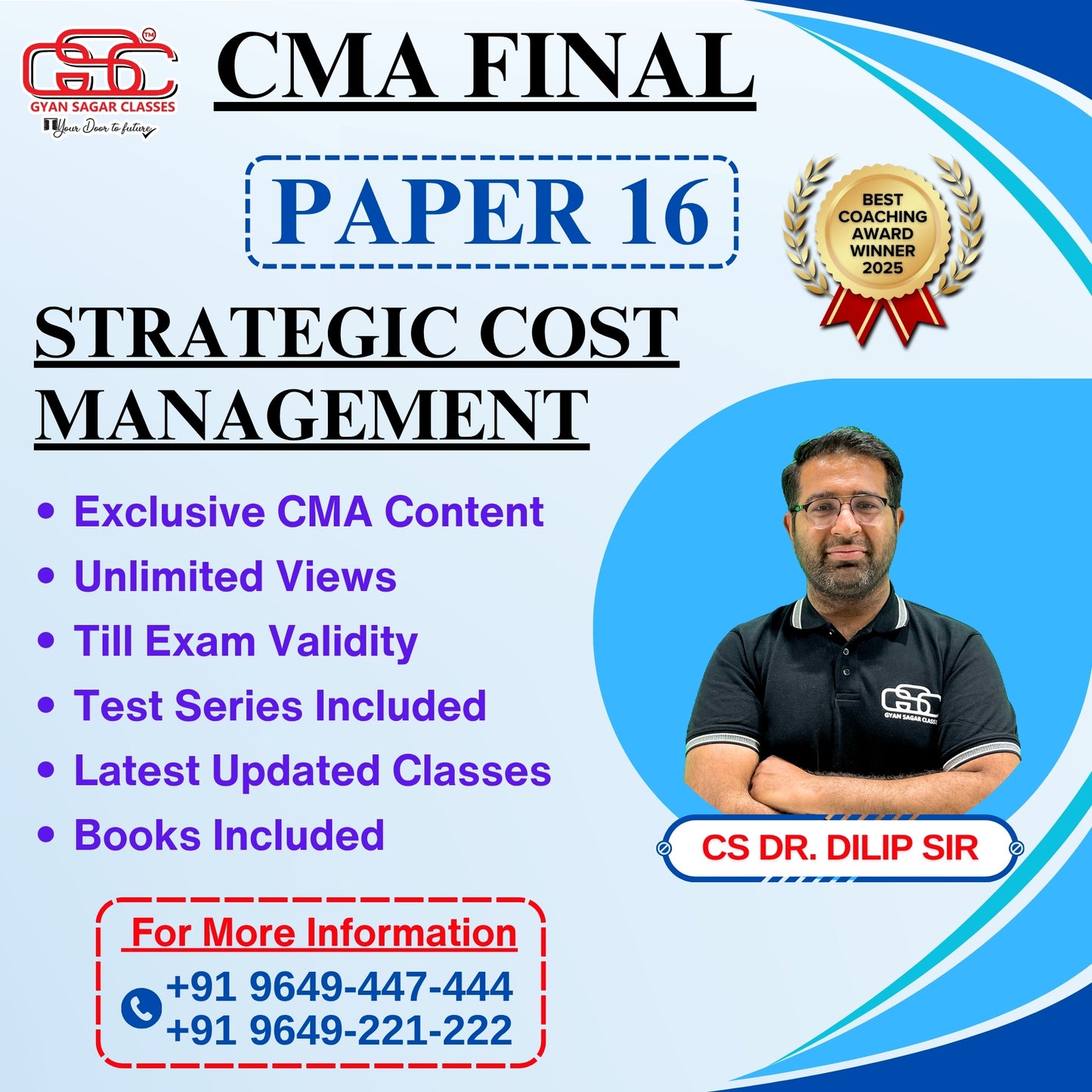CMA Cart
Strategic Cost Management (SCM)
Strategic Cost Management (SCM)
Couldn't load pickup availability
Product Information
| Mode |
Download Link with Hard-Book
|
| Duration | Lectures:- 130 (Duration:- 110 – 120 Hours) |
| Video Language | Hindi |
| Faculty Name | CS Dilip Sir |
| Course Material Language | English |
| Video Run on | Computer / Laptop / Android Mobile (Video Lectures Do Not Run on Apple Device Please Check FAQ) |
| Study Material | Hard Book |
| Package Details | Video Lectures + Study Material |
| Exams validity | Till Exam |
| Doubt Solving Facility | Email, WhatsApp, Call |
| Delivery Free Delivery | Non Cancellable |
| Product Dispatch | Within 24 to 48 Working Hours |
| Total No. Views | Unlimited Views (Till Exam) |
Content As Per Syllabus
Section A. Strategic Cost Management for Decision Making
Module 1. Introduction to Strategic Cost Management 1.1 Concepts of Strategic Cost Management in Different Stages of Value Chain 1.2 Cost Control and Cost Reduction – Contemporary Techniques 1.3 Value Chain Analysis and Value Engineering - Business Process Re-engineering 1.4 Supply Chain Management
Module 2. Quality Cost Management 2.1 Managing Quality in Competitive Environment 2.2 Cost of Quality 2.3 Total Quality Management 2.4 Lean Accounting 2.5 Six Sigma
Module 3. Decision Making Techniques 3.1 Decisions involving Alternative Choices 3.2 Pricing Decisions and Strategies 3.3 Transfer Pricing 3.4 Relevant Cost Analysis 3.5 Target Costing 3.6 Product Life Cycle Costing 3.7 Asset Life Cycle Costing 3.8 Decision Making using Probability
Module 4. Activity Based Management and Just in Time (JIT) 4.1 Activity Based Cost Management - Concept, Purpose, Stages, Benefits, Relevance in Decisionmaking and its Application in Budgeting, Responsibility Accounting, Traditional Vs. ABC System – Comparative analysis 4.2 JIT – introduction, Benefits, Use of JIT in measuring the Performance 4.3 Throughput Accounting 4.4 Back flush Accounting 4.5 Benchmarking
Module 5. Evaluating Performance 5.1 Variance Analyses 5.2 Uniform Costing and Inter-firm Comparison
Section B. Quantitative Techniques in Decision Making
Module 6. Linear Programming • Introduction • Definition of Linear Programming • Requirements of Linear Programming • Advantages of Linear Programming • Limitations of Linear Programming • Application Areas of Linear Programming • Formulation of Linear Programming Problem • Some Definitions • Methods of Solving Linear Programming Problems • Special Cases in Linear Programming • Duality
Module 7. Transportation • Introduction • Linear Programming formulation of Transportation Problem • Procedure of solution of Transportation Problems • Special cases of Transportation
Module 8. Assignment • Introduction • Mathematical statement of the problem • Hungarian Method • Special cases in Assignment Problem • Problem of Travelling Salesman
Module 9. Game Theory • Introduction • Basic Terms • Assumptions in a Game • Solution of Pure Strategy Games with Saddle Point • Principle of Dominance • Solution of Mixed Strategy Games • Limitations of Game Theory
Module 10. Simulation • Introduction • Definitions • Application of Simulation • Advantages of Simulation • Limitations of Simulation • Types and Models of Simulation • Steps involved in constructing and using a Simulation Model • Monte Carlo Simulation • Random Numbers
Module 11. Network Analysis – PERT, CPM • Introduction • CPM and PERT • Difference between PERT and CPM • Applications • Basic Terminology related to Network • Common Errors in drawing Network diagrams • Rules for drawing Network diagram • Procedure of drawing a Network Diagram • Time Estimates and Critical Path in Network Analysis • Three Time Estimates of PERT • Probability of Project completion within a stipulated time • Crashing (Time – Cost Trade Off) • Procedure of Crashing a Project Network
Module 12. Learning Curve • Concept of Learning Curve • Significance of Learning Curve • Phases in Learning Curve • Learning Curve Ratio • Areas of Consequence • Graphical presentation of Learning Curve • Pros and cons of the Learning Curve Theory • Uses of Learning Curve • Limitations to the usefulness of the Learning Curve • Factors affecting Learning Curve • The Experience Curve
Module 13. Business Application of Maxima and Minima • Introduction • Unconstrained Optimization • Equilibrium of a Firm • Constrained Optimization
Module 14. Business Forecasting Models (Time Series and Regression Analysis) • Introduction • Importance of Business Forecasting in different areas of an organisation • Pros and Cons of Business Forecasting • Limitations of Business Forecasting • Types of Business Forecasts • Methods or models of Business Forecating ► Quantitative Methods ~ Regression Analysis ~ Time Series Analysis ~ Exponential Smoothing ~ Input-Output Models ► Qualitative Methods
Module 15. Introduction to Tools for Data Analytics • Introduction • Steps in Data Analytics • Types of Data Analytics • Tools for Data Analytics
Share


